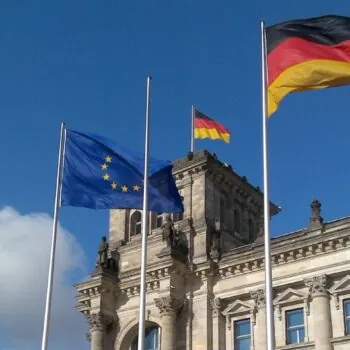Amid rising geopolitical tensions and new geoeconomic dynamics – not least the erosion of the rules-based international order itself – the new German government is having to swiftly and comprehensively reorientate its external relations across all policy areas. One goal must be effective international cooperation on decarbonisation and dealing with climate change – essential for prosperity, competitiveness and security. Our briefing outlines strategic action the German government can take in its foreign relations to strengthen Europe and act effectively on a global scale.
Amid the considerable international challenges, shaping global decarbonisation and taking a decisive approach to managing the impacts of climate change are increasingly relevant. By taking a lead in these areas, Germany can strengthen its geopolitical position and that of the EU, contribute to long-term stability in global trade, reduce the risks of fossil dependencies, take advantage of the opportunities offered by global decarbonisation and contribute to the credibility of multilateral cooperation.
In the coalition agreement Germany’s governing parties committed themselves to an integrated policy approach that brings together foreign and defence policy as well as development cooperation.
The German government should therefore pursue an integrated, strategic approach in shaping Germany’s foreign relations – taking into account geoeconomic and geopolitical considerations.
Such an approach should link the following strategic aims.
Through an EU foreign policy coordinated with the member states, strategic partnerships, and an integrated strategy for growth and decarbonisation. Goals in the strategy should include the expansion of fiscal space, targeted strategic investments for the transition to a clean economy, and clear signals for an ambitious EU climate policy, especially relating to the 2040 target and the EU’s Nationally Determined Contribution (NDC) under the Paris Climate Agreement, which should be submitted in September 2025.
In particular through the targeted expansion of foreign trade relations, strategic partnerships and networks, investment incentives for climate-neutral technologies, products and services in partner countries, and by accounting for climate risks in funding for export promotion. Besides conventional instruments, however, it is also important to use innovative formats such as cleantech clusters and international innovation ecosystems.
This can be achieved, among other things, by strengthening the World Trade Organization (WTO), factoring climate risks into export promotion, providing diplomatic support for instruments such as the European Carbon Border Adjustment Mechanism (CBAM), and through strategic cooperation with key emerging economies and regions.
By phasing out fossil fuels and ramping up clean technologies in cooperation with international partners.
Including bilateral and plurilateral partnerships and dialogues such as the Just Energy Transition Partnerships, Country Platforms to improve the governance of multi-stakeholder processes, and the Climate Club.
Including through mandate reforms with a focus on climate and resilience, as well as more flexible allocation conditions for financial assistance in climate and crisis situations.
Through a strong international presence, a clear position towards China as a key actor and partner in international climate protection, and through “alliances of the willing” such as the Global Energy Transition Forum. COP30 in Brazil must lay the foundations for the next decade of international climate policy, initiate institutional reforms and maintain credibility of the effectiveness of the Paris Climate Agreement. Other forums, such as G7/G20 meetings and the IMF and World Bank meetings, should be more closely linked to the decarbonisation agenda (coherent multi-forum management).
Note: The German-language briefing Europa Stärken, International Gestalten was originally published on 21 July 2025. Read the English-language executive summary here.


